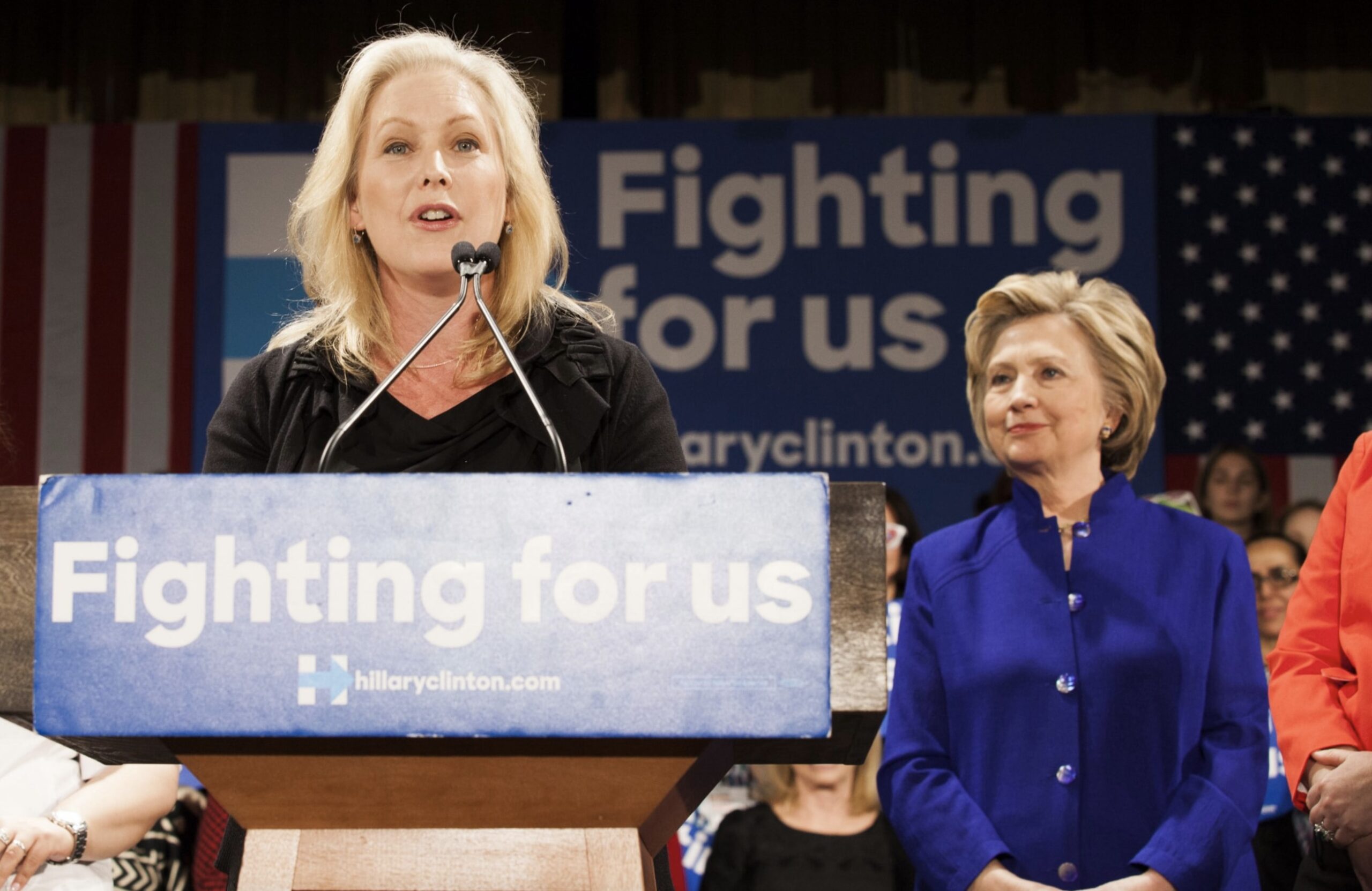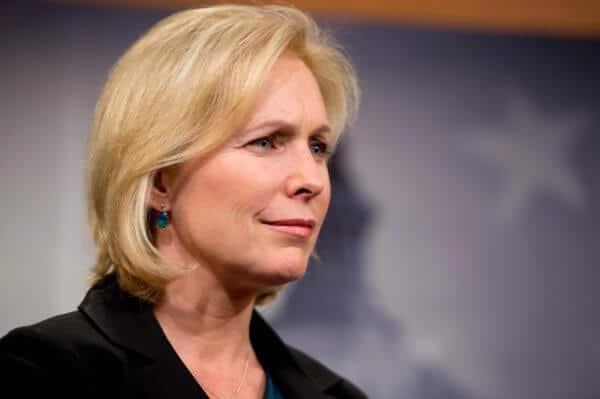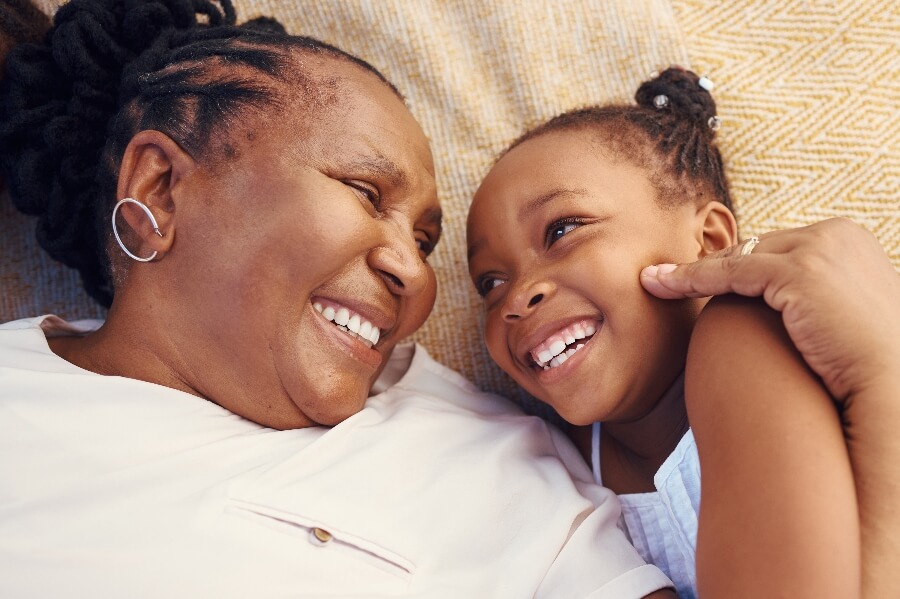It’s called the Trump Bump: In certain quarters, nothing sets you up for success faster, or more firmly, than the full Twitter Treatment from the commander in chief, as Kirsten Gillibrand discovered, bigly, last December 12 when she became the beneficiary of this peculiar form of presidential largesse. After the junior senator from New York told CNN’s Christiane Amanpour that Trump should resign because of his long history of sexual misconduct, the president unleashed a sexually suggestive 5:00 a.m. tweet in which he all but called the 51-year-old senator a prostitute: “Lightweight Senator Kirsten Gillibrand, a total flunky for Chuck Schumer…would come to my office ‘begging’ for campaign contributions not so long ago (and would do anything for them).”
The Twitterverse exploded. “Are you really trying to bully, intimidate and slut-shame @SenGillibrand?” Senator Elizabeth Warren demanded of the president, adding, “do you know who you’re picking a fight with?” Gillibrand’s own response—“you cannot silence me or the millions of women who have gotten off the sidelines to speak out about the unfitness and shame you have brought to the Oval Office”—was retweeted 153,000 times (compared to 23,000 retweets of Trump’s original diatribe). Later that afternoon, when Gillibrand appeared at a routine meet-and-greet with the press about tractor-trailer highway safety, she was surrounded by a thick scrum of reporters.
Gillibrand’s white-hot status has unquestionably been aided and abetted by the Trump presidency and its galvanizing effect on women.
After nine years in the Senate, she was an overnight sensation. The quiet rumble of presidential talk that had already been swirling around Gillibrand amped up another few decibels.
In truth, Gillibrand’s star has been steadily rising since she took over Hillary Clinton’s Senate seat in January 2009, but its current white-hot status has unquestionably been aided and abetted by the Trump presidency and its galvanizing effect on women. Gillibrand herself has noted that she’s been recognized in public more in the last six months than in her entire Senate career.
During her tenure, the senator, a former college athlete, has gained a reputation with colleagues on both sides of the aisle as an indefatigable fighter—one who, flinging the F-word with abandon, refuses to back down on an issue, whether it’s the end of “don’t ask don’t tell” (a policy she waged an 18-month battle to end) or the importance of paid family leave (she introduced the Senate version of the Family and Medical Insurance Leave—FAMILY—Act last February). And she makes no secret of her contempt for Trump’s statements (“what a disgrace,” she said of his comments on Charlottesville); his policies (the Republican tax bill he signed in December was “written by the rich and powerful for the rich and powerful”); or, most notably, his Cabinet picks, for whom she cast a near-perfect record of “no” votes, sparing only two of the 22 nominees up for confirmation last year.
Learning the Ropes
A classic New York liberal, you say? Perhaps. But Gillibrand has a complicated history, and her hard-core liberalism is a relatively recent development—one that didn’t seem to be in the cards back in 2009, when this then-moderate representative from the 20th district in upstate New York got a lucky break from a powerful man. (Do we sense a pattern here? For all her hard work and quick learning curve, Gillibrand, like most successful people, has had some extraordinary good fortune along the way.) Born into a highly political family in Albany with deep roots in state and city politics, Gillibrand became a corporate attorney in New York City after graduating law school, but she found the work (Philip Morris was a major client) empty and unfulfilling. Public service beckoned, and she first ran for Congress in 2006, winning 53 percent of the vote in her solidly Republican district.
What a difference a decade makes. Gillibrand 2009 and Gillibrand 2018 are near-polar opposites politically.
When Hillary Clinton’s Senate seat came up for grabs in 2009—she vacated it to become secretary of state in the first Obama Administration—Gillibrand lobbied hard for the job. Caroline Kennedy made a half-hearted play for the seat with a brief, lackluster tour of upstate New York but ended up dropping out. The designated senatorial appointer was David Paterson, the now largely forgotten interim governor of New York who took over after Eliot Spitzer resigned in disgrace because of his patronage of call girls (got all that?). Paterson had supposedly whittled down his choices to Gillibrand, a family friend, and Andrew Cuomo (HUD Secretary under Bill Clinton and now New York’s governor). Gillibrand reportedly tipped the balance when she sympathized with Paterson after he was cruelly lampooned for his partial blindness on Saturday Night Live, then in one of its legendary slumps.
What a difference a decade makes. Gillibrand 2009 and Gillibrand 2018 are near-polar opposites politically. Representative Gillibrand, a member of the conservative “Blue Dog caucus” and former advocate for Big Tobacco, not only backed gun rights, telling constituents that she and her husband “keep two rifles under our bed” and earning an A grade from the NRA, but she also consistently voted against gay- and immigrant-rights legislation. Once her constituency expanded to include the total population of one of the bluest states in the union—voila!—Senator Gillibrand began racking up one of the most liberal voting records in the Senate.
Why the turnaround? A laudatory profile in a recent issue of Vogue (not-so-subtly titled “The Contender,” and cover lined with the phrase “2020 Vision: All Eyes on Kirsten Gillibrand”) attributes her “evolution” to her uncanny ability to listen and learn, relate to ordinary people, and empathize with her constituents’ grass-roots problems. Other, perhaps more cynical observers, see “opportunism, pure and simple.”
Who Is Kirsten Gillibrand?

Kirsten Gillibrand campaigned hard for Hillary Clinton in 2016.
“Do You Know Who You’re Picking a Fight With?” In some ways, Elizabeth Warren’s Twitter challenge to Donald Trump can be read another way—as in, no, we actually don’t know who she is. For starters, despite all her recent acclaim, Gillibrand is still, for now, anyway, widely unknown in huge swaths of America outside of the Beltway and her home state of New York. Even when you ask New Yorkers what they think of her, many will look at you blankly. “Is she that actress…?” someone will inevitably ask, usually substituting the name “Kristen” for “Kirsten,” a mistake—quelle surprise—that Trump himself made in an early tweet or two.
Such is the paradox of political prominence in a country where only 56 percent of those eligible bothered to vote in the last presidential election, and just 37 percent can name their congressional representatives. The more surprising news about Gillibrand is that among those who do know her, opinions are strong but wildly varied, even among the liberal, over-45 women who would seem to be her natural base. There is an almost Rashomon-ish quality to the way she is perceived that is most evident in her public condemnations last fall of both President Bill Clinton and Senator Al Franken.
The more surprising news about Gillibrand is that among those who do know her, opinions are strong but wildly varied, even among the liberal, over-45 women who would seem to be her natural base.
The Clintons had been early mentors and supporters of Gillibrand, and Hillary Clinton wrote the foreword to Gillibrand’s 2014 memoir, Off the Sidelines, in which Gillibrand describes HRC’s role in her life as inspirational. So when Gillibrand told an interviewer that President Clinton’s resignation would have been “the appropriate response” to the Lewinsky scandal, a collective gasp went up among seasoned politicos, who blasted her for hypocrisy and, in an unlikely echo of Donald Trump, “disloyalty.” Gillibrand initially dismissed these criticisms as “ridiculous,” though she later qualified her remarks, but many women interviewed for this article also found her denunciations of Clinton discomfiting (“what a turncoat”), not to mention “politically expedient,” “hard-core publicity-seeking,” or simply “mean.”
Whether alienating the Clintons will indeed prove “expedient” is an open question that also generates a wide diversity of opinion; much depends on how powerful the couple remain within the Democratic rank-and-file. But other women who were interviewed, many (though not all) in the under-40 demographic, applauded Gillibrand’s “bravery,” saying, as did one college senior, “it’s about time someone from his own party called him out.” So far, no major Democrat has followed Gillibrand in suggesting that Clinton should have resigned.
The Generational Divide
Amid the ambivalence, one fact emerges with perfect clarity: This woman is no shrinking violet. She can appear nearly fearless at times, particularly in her most controversial political move to date: leading her caucus in pressuring Senator Al Franken, a once-close colleague with a similar voting record, to resign over several alleged incidents of sexual misconduct—in advance of the ethics probe that both parties had called for. Then again, fearlessness can read, to her detractors, as stepping on anyone who gets in her way, self-righteousness, egotism, naked ambition, or just plain bossiness, itself a gender pejorative that Sheryl Sandberg has led a campaign to ban. After all, when is the last time you heard a man described as “bossy”?
“Who appointed her the moral arbiter?” asked a Washington paralegal, 49, who admitted to being “furious” at Gillibrand for what she called the senator’s “railroading” of Franken, a liberal, “woman-friendly” senator. “Shouldn’t he at least have gotten due process?”
Fearlessness can read, to her detractors, as stepping on anyone who gets in her way, self-righteousness, egotism, naked ambition, or just plain bossiness.
“She lost me when she threw Franken under the bus,” said a 60-something Manhattan-based writer. “His transgressions pale next to those of Roy Moore [who was defeated in his Alabama Senate race days later] or Donald Trump himself.”
But—confirming a generational divide on this matter—a 32-year-old graduate student from Ithaca, New York, begged to differ. And two of her friends, also 32, wholeheartedly agreed. “No, Franken had to go,” the grad student said firmly. “Eight women—eight!—came forward to accuse him. To me, Gillibrand’s a hero for standing up and saying wrong is wrong, and that Democrats have to model the same behavior they demand in everyone else.”
But all this contretemps over…well, powerful white men…probably won’t matter if the senator becomes the presidential nominee in 2020. Ultimately, a campaign pitting Gillibrand against a male Republican (incumbent Pence, perhaps?) would likely boil down to the same single nonstarter that dogged Hillary Clinton and will doubtless dog any other woman presumptuous enough to believe she is qualified to be POTUS. “It’s not that I don’t want a woman for president,” people will say, as millions did about HRC. “I just don’t want that particular woman.” Suddenly, traits that seem so commendable in men—ambition, determination, single-mindedness (what, no hobbies like golf???), a full-throated laugh—become insuperable problems when they show up in a woman. This is why even women who profess to “love” Gillibrand will tell you that she, or any other woman, shouldn’t be the nominee. “Hillary showed us a woman can’t be elected, and the stakes are too high to take the chance,” said a Chicago-based graphic designer, 43, shaking her head sadly.
As for the “particular woman” at hand, some have already counted her out. “There’s no space for Gillibrand to run for president in 2020,” a Washington insider (a veteran tax lobbyist) pronounced recently. When asked to explain, he said with a shrug, “There’s already another New York Democrat ahead of her [Andrew Cuomo], and there’s already another woman ahead of her [Elizabeth Warren]. There’s no room for Gillibrand.” While there may be precedent for a politician bowing to a more highly ranked member of the same party from the same state—though let’s not forget that Gillibrand edged out Cuomo back in 2009 when she got the Senate nod—just imagine a male politician thinking, or being expected to think, “Hmmm, guess I won’t run for president since there’s already a man in the race.” Yeah. Said no one ever.
Further Reading:
Kirsten Gillibrand is Exactly the Kind of 2020 Candidate Democrats Need





















0 Comments